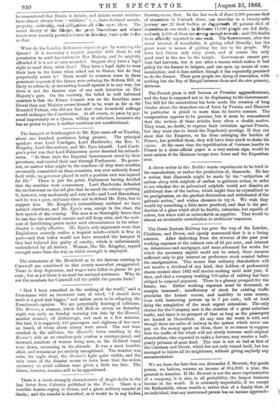The Great Eastern Railway has gone the way of the
London, Chatham, and Dover, and openly announced that it is a losing concern. After deducting from the revenue of the past year working expenses at the ruinous rate of 56 per cent., and interest on debentures and mortgages, and sums advanced for works for which the necessary capital could not be raised, there remains sufficient only to pay interest on preference stock created before the amalgamation. This means that ordinary shareholders will not receive a dividend of any kind, that holders of preferential shares created since 1862 will receive nothing until next year, if then, and that a company working 700 miles of railway has been obliged to suspend payment. There is a gloomy prospect for the future, too. Either working expenses must be decreased, or receipts increased ; insufficiency of stock for existing traffic precludes the former course, and inability to raise money, even with borrowing powers up to 7 per cent., will at least delay the completion of the most urgent extensions. The only chance for the Company now is the creation of a great suburban traffic, and there is no prospect of that as long as the passengers are landed in Shoreditch. At any rate the worst is told, and though there are miles of railway in the system which never can pay on the money spent on them, there is no reason to suppose that the traffic of the whole will not slowly increase until original shareholders, who expected to make a fortune, may receive a half- yearly pittance of some kind. The case is not so bad as that of the Chatham and Dover, which has not only ruined itself, but has managed to injure all its neighbours, without giving anybody any accommodation.






























 Previous page
Previous page